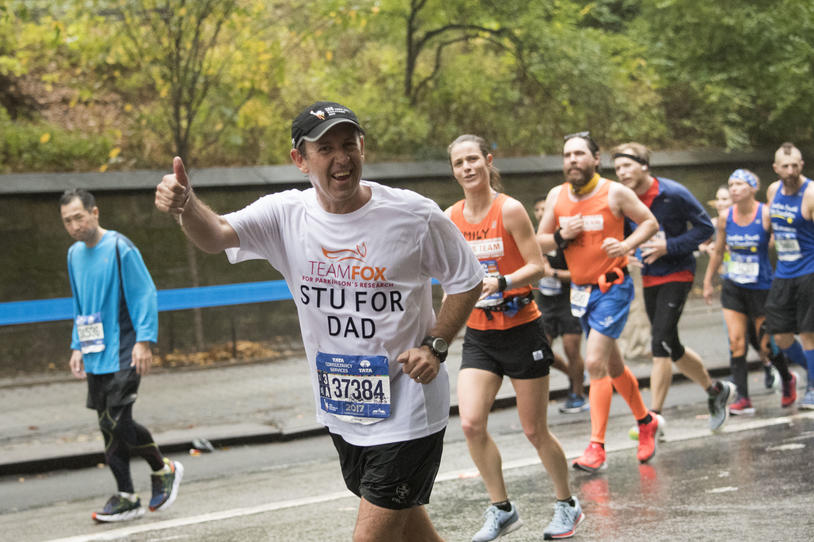
Coach Bennet, Nike Running Global Head Coach, whom I’ve listened to on many a training run, has a mantra: “This is about running. This is not about running.” Similarly, this blog post is about running, but it’s not about running. So, even if seeing the words “marathon” and “running” make you want to run and hide, read on. There’s something here that will, hopefully, speak to you, whether you live with Parkinson’s or care about someone who does.
I fell in love with running outdoors during the pandemic. Without access to the gym or a treadmill, I had to choose between running outside or not at all. Fast forward three-and-a-half years and too-many-to-count races later, and I’m taking on the 2023 New York City Marathon with The Michael J. Fox Foundation’s Team Fox. (Big shoutout to my fellow Team Foxers. The NYC Marathon team is on track to raise $750K for Parkinson’s research.)
As a movement disorders neurologist and lifestyle medicine physician, I’m always eager to talk about exercise. It’s a powerful tool that can help manage Parkinson’s disease (PD) and even, potentially, prevent or delay its onset. And exercise is one of, if not the, best things all of us can do for our body, brain and mental health.
The funny thing about training for a marathon is that these health benefits, while certainly there, are almost secondary — they aren’t the sole reason I work out, more of a nice byproduct. Running (literally) toward a big goal shifted my mindset and approach to exercise. It made working out more fun and purposeful, and therefore easier to stick with. Rather than 30 minutes of cardio because it’s “good for my heart,” I run or work out for a specific reason — to increase speed or distance or give my body a break while maintaining fitness. Rather than strength training to “build stronger bones,” I lift weights in ways that make me a more efficient, less injury-prone runner.
My intention isn’t to convince you to take up running or even to convince you of exercise’s benefits. I’m sure you’re aware of those! That’s not the problem for most of us. Instead, it’s that those vague, potentially far-off or uncertain benefits may not be enough to start or stick with exercise, especially when life gets in the way. So, it can be helpful to rethink your approach. Here, a few lessons I learned from marathon training that may encourage you to look at exercise or some other part of life with Parkinson’s in a new light:
- Set a goal. It makes all the difference.
Goals are a compass for how we want to live life.
Setting a goal of running my first marathon helped me structure my life, activities and support system to achieve that goal. That included cutting out alcohol, getting extra sleep and doing some intense workouts. But it has also meant I have a clear aim; I know where I want to go and what will (and won't) help me get there. The goal helps me stay on track and celebrate progress along the way. Exercise goals are important, but equally so are goals for other areas of life — things like aiming to spend time with the grandkids once a week, travel to that place you've always wanted to go, or even take walks around the neighborhood or through the grocery store without fear of falling. Goals remind us what's important and guide us toward living life the way we want to.
- Have a plan. And a plan for when things don’t go as planned.
Planning helps us take control where we can.
The marathon is happening, rain or shine. I can’t control the weather, but I can practice running in different conditions and with different equipment so I’m ready for whatever Mother Nature brings on race day. Making a plan — and a backup plan — can set us up for success in both day-to-day activities as well as our future, unknown as it may be. And the older we get and the longer we live with Parkinson’s, the more helpful planning can be, for everything from an evening out with friends to a big social event like a wedding to an earlier-than-anticipated retirement. - Listen to your body. And rest when that’s best.
You know yourself best.
Our bodies tell us when something’s not right — and if we don’t pay attention, they’ll shout until we do. We may not know the exact cause or treatment, but that’s where experts come in — our movement disorder specialist for Parkinson’s or coach/physical therapist for running. It’s our job to tune in to how we feel so that we can best communicate with our care and support team. It’s their job to help us, together, figure out next steps. Sometimes, that includes more rest (or fun, relaxing activities) — from exercise as well as our “always on” lives. - Find joy in your journey.
Comparison is the thief of joy.
My running pace is different than someone else’s — as is my age, experience with running, etc. And your Parkinson’s journey is yours alone. Learn from others, get and give support (few things are more gratifying than helping someone else!) and compare notes on life with the disease. But avoid the temptation to compare “who’s doing better or worse.” Along those lines, try to be in the moment and enjoy something about where you are right now. Be grateful where you can — for the sun shining, a delicious piece of chocolate, or the comfy chair in which you’re sitting.
Learn more about my upcoming marathon with Team Fox and stay tuned for a new guide on exercise and Parkinson’s coming soon.
